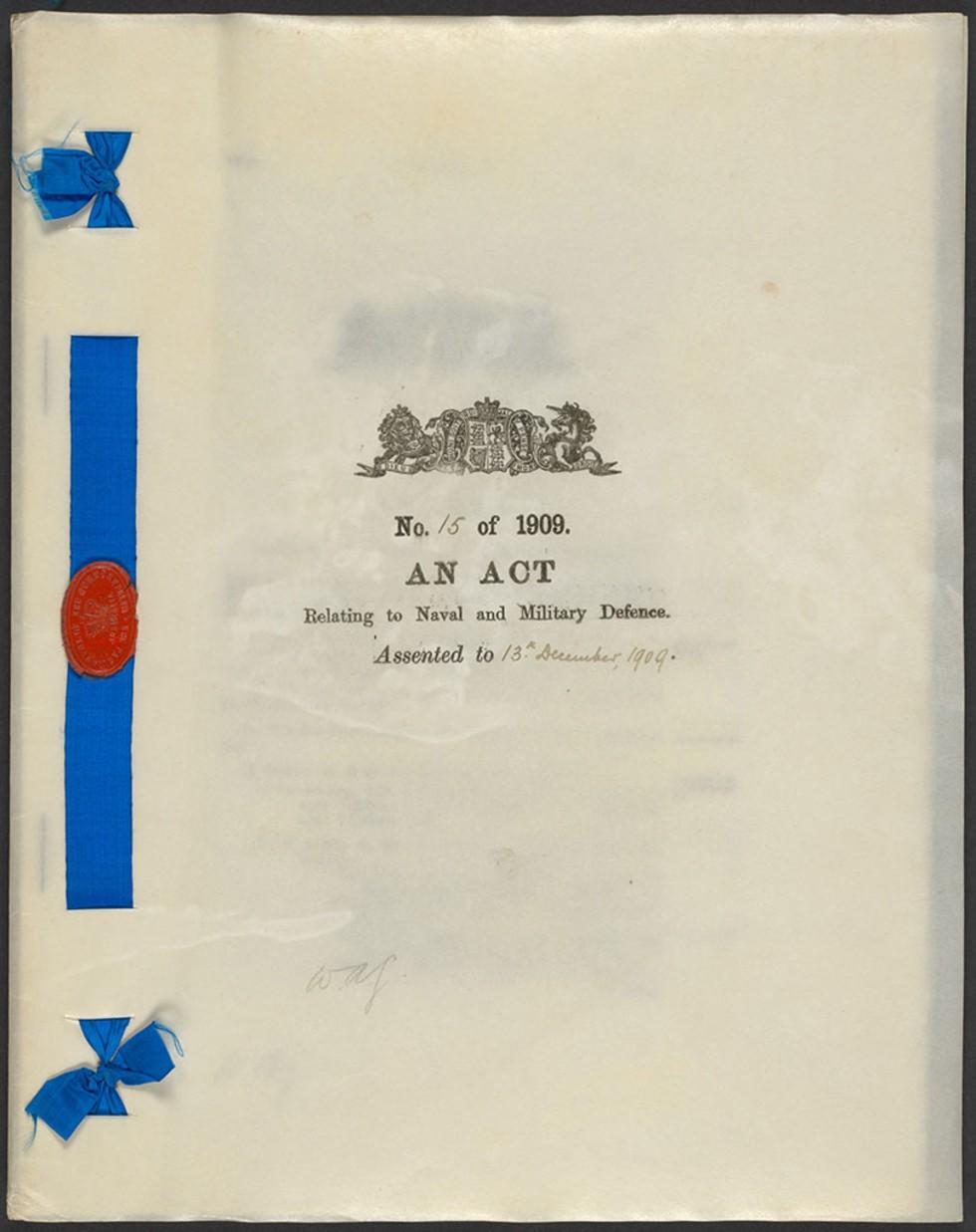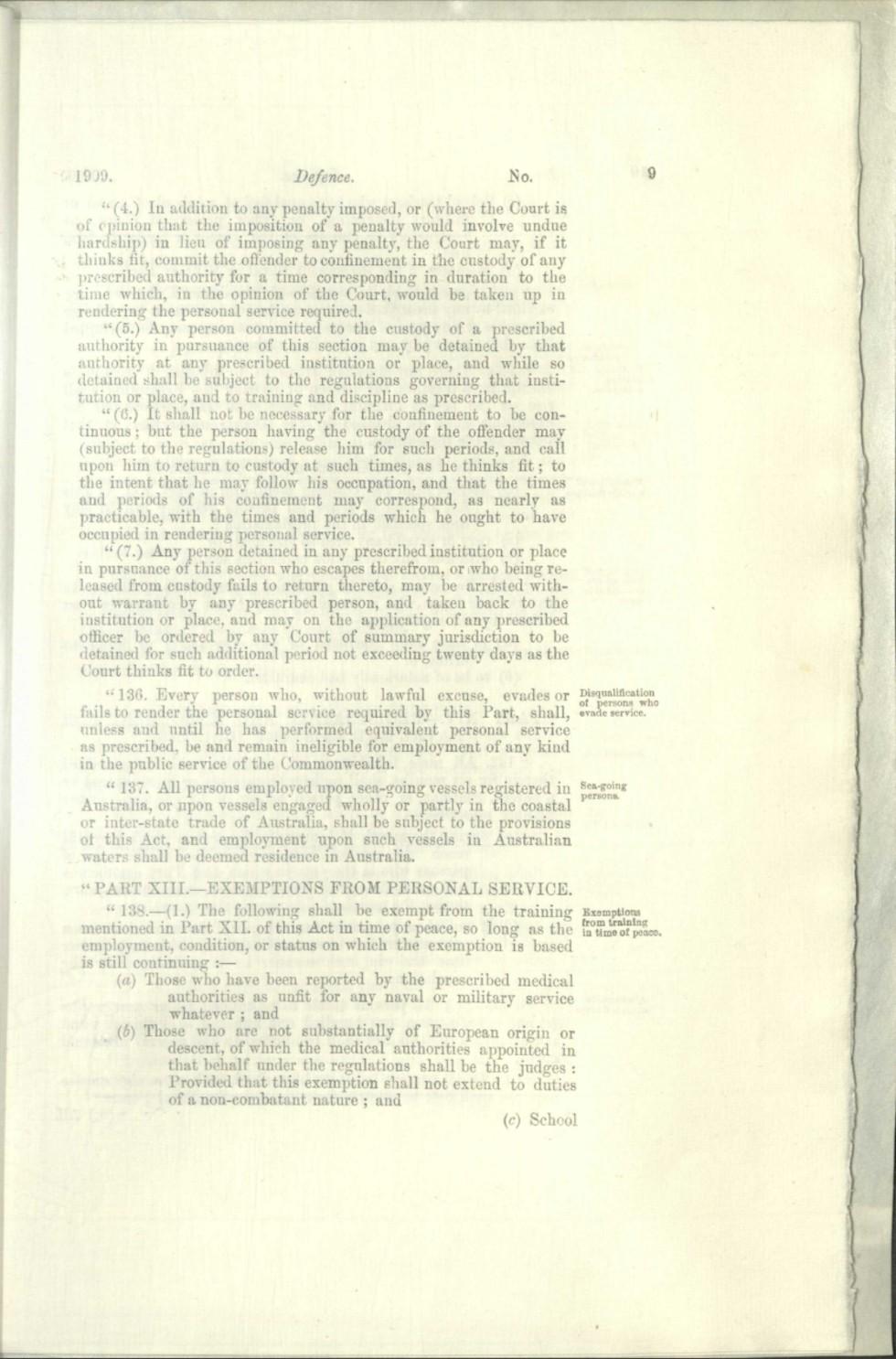

Aboriginal and Torres Strait Islander people should be aware that the National Archives' website and collection contain the names, images and voices of people who have died.
Some records include terms and views that are not appropriate today. They reflect the period in which they were created and are not the views of the National Archives.



[Page 1]
[Title page of the Act, bound with a blue ribbon, on which there is a red wax seal.]
[Coat of arms of Australia]
No. 15 of 1909.
AN ACT
Relating to Naval and Military Defence.
Assented to [Handwritten addition:] 13th December, 1909.
[Page 2 – page 9 of the Act.]
[Page header:] 1909. Defence. No. [Page] 9
"(4.) In addition to any penalty imposed, or (where the Court is of opinion that the imposition of a penalty would involve undue hardship) in lieu of imposing any penalty, the Court may, if it thinks fit, commit the offender to confinement in the custody of any prescribed authority for a time corresponding in duration to the time which, in the opinion of the Court, would be taken up in rendering the personal service required.
"(5.) Any person committed to the custody of a prescribed authority in pursuance of this section may be detained by that authority at any prescribed institution or place, and while so detained shall be subject to the regulations governing that institution or place, and to training and discipline as prescribed.
"(6.) It shall not be necessary for the confinement to be continuous; but the person having the custody of the offender may (subject to the regulations) release him for such periods, and call upon him to return to custody at such times, as he thinks fit; to the intent that he may follow his occupation, and that the times and periods of his confinement may correspond, as nearly as practicable, with the times and periods which he ought to have occupied in rendering personal service.
"(7.) Any person detained in any prescribed institution or place in pursuance of this section who escapes therefrom, or who being released from custody fails to return thereto, may be arrested without warrant by any prescribed person, and taken back to the institution or place, and may on the application of any prescribed officer be ordered by any Court of summary jurisdiction to be detained for such additional period not exceeding twenty days as the Court thinks fit to order.
"136. [Title in margin is: 'Disqualification of persons who evade service'.] Every person who, without lawful excuse, evades or fails to render the personal service required by this Part, shall, unless and until he has performed equivalent personal service as prescribed, be and remain ineligible for employment of any kind in the public service of the Commonwealth.
"137. [Title in margin is: ‘Sea-going persons.’] All persons employed upon sea-going vessels registered in Australia, or upon vessels engaged wholly or partly in the coastal or inter-state trade of Australia, shall be subject to the provisions of this Act, and employment upon such vessels in Australian waters shall be deemed residence in Australia.
[Heading:] "PART XIII.—EXEMPTIONS FROM PERSONAL SERVICE.
"138.—(1.) [Title in margin is: 'Exemptions from training in time of peace.'] The following shall be exempt from the training mentioned in Part XII. of this Act in time of peace, so long as the employment, condition, or status on which the exemption is based is still continuing:—
(a) Those who have been reported by the prescribed medical authorities as unfit for any naval or military service whatever; and
(b) Those who are not substantially of European origin or descent, of which the medical authorities appointed in that behalf under the regulations shall be the judges: Provided that this exemption shall not extend to duties of a non-combatant nature; and
(c) School
[End of record excerpt.]
The Defence Act 1909 prevented people ‘not substantially of European origin or descent’ from enlisting in wartime. During the First World War, this law was meant to be enforced by medical officers but they did not always abide by the ruling.
Learn how to interpret primary sources, use our collection and more.
